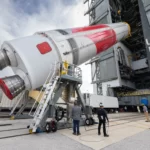The anticipated launch of United Launch Alliance’s (ULA) Vulcan rocket has faced a setback, leading to a delay in its planned debut. This unexpected development has raised various challenges for ULA, requiring adjustments and further preparations. The delay highlights the complexity and meticulous nature of rocket launches, underscoring the importance of thorough testing and safety protocols in the aerospace industry.
The Delay and Implications:
According to recent reports from The New York Times, the Vulcan rocket’s launch has been postponed due to technical issues discovered during the final stages of testing. ULA, a joint venture between aerospace giants Boeing and Lockheed Martin, has not disclosed specific details regarding the nature of the problem or the revised launch timeline. The delay is a significant setback for ULA, as the Vulcan rocket is poised to become their flagship launch vehicle, replacing the Atlas V.
Challenges in Rocket Development:
Developing a new rocket is an intricate process that involves numerous engineering and technical challenges. ULA’s Vulcan rocket has been in development for several years, aiming to enhance performance, reduce costs, and provide more flexibility for a variety of mission requirements. The delay underscores the complexities associated with ensuring the reliability, safety, and performance of such advanced aerospace systems.
Safety and Quality Assurance:
Rocket launches demand meticulous attention to safety and quality assurance. Any potential technical issue discovered during testing warrants careful evaluation and resolution before proceeding with the launch. The delay demonstrates ULA’s commitment to upholding rigorous standards and prioritizing the safety of both the payload and personnel involved in future missions.
Industry Competition and Adaptation:
The space industry is highly competitive, with various players striving to develop cutting-edge technologies and secure lucrative launch contracts. The delay of the Vulcan rocket’s launch prompts ULA to recalibrate its plans and adjust to the evolving market dynamics. ULA will likely use this delay as an opportunity to address any technical concerns, refine their launch procedures, and strengthen their position in the commercial space launch market.
Continuous Improvement and Innovation:
Delays in rocket launches are not uncommon and are part of the iterative process of improving spaceflight capabilities. ULA’s dedication to addressing the technical issues discovered during testing demonstrates their commitment to delivering a reliable and efficient launch vehicle. By identifying and rectifying these challenges, ULA aims to enhance the overall performance and reliability of the Vulcan rocket.
Conclusion:
The delay in the launch of ULA’s Vulcan rocket highlights the complex nature of rocket development and the meticulous testing procedures involved. While setbacks are to be expected in the aerospace industry, ULA’s commitment to safety and quality assurance is commendable. The delay provides an opportunity for ULA to address the technical issues, refine their launch procedures, and ultimately deliver a robust and reliable launch vehicle. As the company adapts to the evolving space market, the Vulcan rocket is poised to play a pivotal role in ULA’s future endeavors and contribute to advancing space exploration and commercial spaceflight capabilities.



